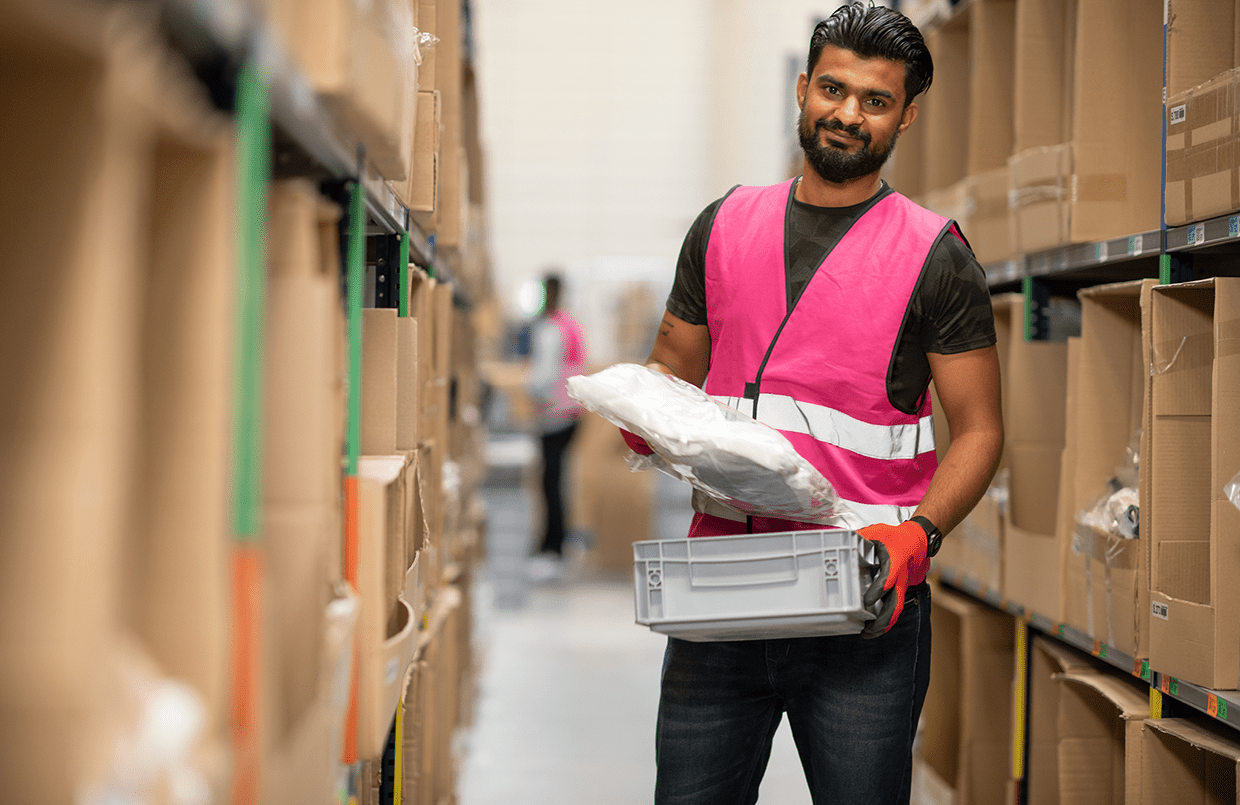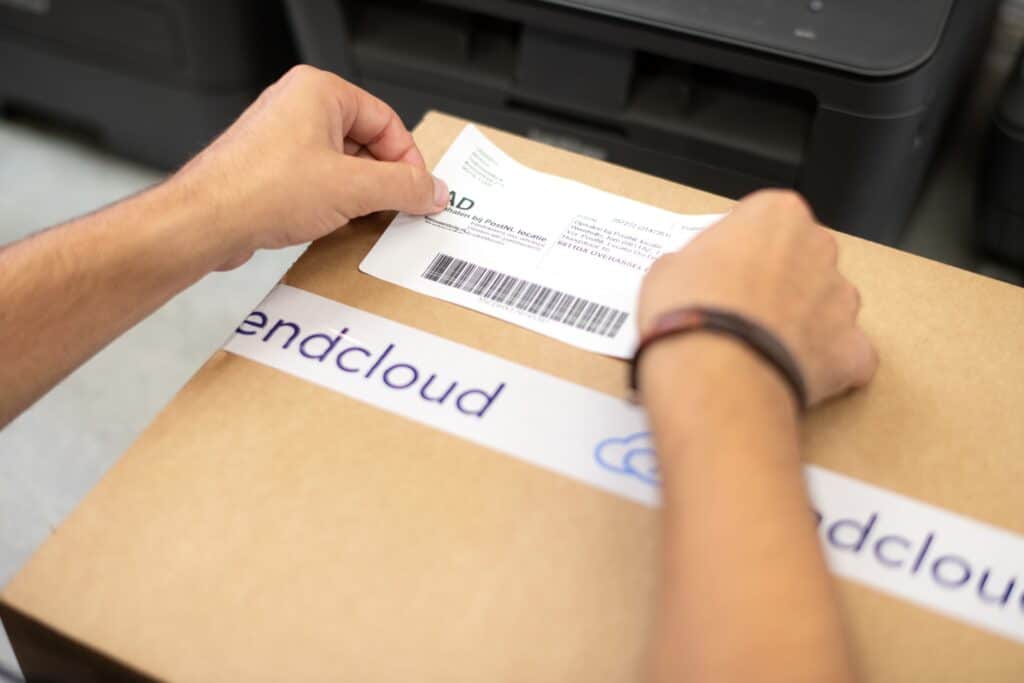Are you unsure of how to ship internationally and want to know how to get started?
Getting your products to your customers is a complex process, and there are many things that can go wrong.
Even before you ship your first parcel, you might find yourself getting lost in all of the paperwork, desperately trying to decode a matrix of logistics, taxes, and customs.
Thankfully, there is a solution to every shipping problem for you and your customers.
Employing a third-party logistics solution (3PL) can provide a solution to avoid the need to invest time and capital in establishing a complicated global shipping process.
Do not let the complexity of international shipping daunt you any longer – read on for simple answers to your questions!
How to make international shipping easy:
- What is 3PL?
- 3PL and international shipping: the Pros and Cons
- 7 Best practices when using a 3PL for international shipping
- What to keep in mind when working with a 3PL
- Common mistakes or pitfalls to watch out for
What is 3PL?
Third-party logistics (3PL) refers to a service provider that assists e-commerce merchants in managing their supply chain, enabling them to concentrate on expanding their businesses.
By outsourcing some or all your logistics operations to a fulfilment company, you can take advantage of the services offered by a 3PL.
Companies often engage 3PLs when they are no longer able to handle logistics in-house due to high costs or a lack of time to process customer orders while building their businesses.
In most cases, the 3PL is integrated into the company’s inventory storage and transportation processes.
A 3PL’s services encompass everything along the supply chain, including logistics operations such as:
- Warehousing
- Scheduling and executing the receiving of inventory to the warehouse
- Sorting, managing, and accounting for all inventory
- Maintaining inventory in proper conditions
- Shipping
- Negotiating discounted shipping rates
- Picking, packing, and shipping products
- Assembling products if necessary
- Managing recurring subscription boxes
Simply put, a 3PL provider manages certain aspects of a company’s shipping operations on their behalf. 3PLs are recognised for their expertise in the logistics industry and you in better fulfilling orders to keep your customers satisfied.
3PL and international shipping: The Pros and Cons
An e-commerce store that wants to expand internationally with its shipping can benefit significantly by partnering with a third-party logistics provider (3PL).
The Pros
A 3PL can offer various advantages to your e-commerce store’s international shipping process, including:
- Access to a global network: A 3PL can provide your e-commerce store with access to a global network of carriers, warehouses, and distribution centers to optimise your shipping process and ensure that your products are transported efficiently and effectively.
- Regulatory compliance: International shipping is subject to different regulations and laws in other countries. A 3PL can help your e-commerce store navigate these regulations and ensure that you comply with customs requirements, taxes, and duties.
- Cost efficiencies: By leveraging their existing network of carriers and distribution centers, a 3PL can help e-commerce stores achieve cost savings through economies of scale while also optimizing shipping routes to minimise costs and ensure timely delivery of products.
- Increased visibility and tracking: A 3PL can improve customer satisfaction and reduce the risk of lost or damaged shipments with enhanced visibility and tracking of international shipments for e-commerce stores.
- Expertise and experience: For e-commerce stores, a 3PL’s knowledge and experience in international shipping can help minimise risks and ensure on-time delivery of products in good condition.
Partnering with a 3PL can help your e-commerce store leverage its expertise and resources to optimise its international shipping process and achieve its expansion goals more effectively.
Other benefits of working with a 3PL include the following:
- A proven understanding of international shipping and trade relations
- Established carrier relationships and connections
- No investments are needed to set up a new process or expand logistics operations internally
- Set protocols for handling global shipment issues
- Expert knowledge and contacts to analyse and optimise shipping costs
- A position to scale your business quickly
While partnering with a 3PL for international shipping can offer several benefits, there are also some potential downsides that e-commerce businesses should consider.
The Cons
Here are some of the cons to keep in mind:
- Less control: Outsourcing your international shipping to a 3PL means giving up some control over the process, potentially resulting in less visibility and control over shipment timing.
- Communication hurdles: Working with a 3PL partner in a different country can present communication challenges due to language barriers and time zone differences, which can make coordination and problem-solving more difficult.
- Price: Using a 3PL for international shipping may be more expensive than handling it in-house, factoring in costs for the 3PL’s services, as well as any additional fees for customs clearance, taxes, and duties.
- Control over quality: International shipping presents higher risks of damage or loss due to longer distances and multiple handling points. It’s important to ensure that your 3PL partner has strong quality control processes in place to minimise these risks.
- Regulatory compliance: International shipping is subject to different regulations and laws in different countries, and it’s crucial to ensure that your 3PL partner has the necessary experience and knowledge to help you navigate these regulations and stay in compliance.
For e-commerce businesses, choosing and partnering with a reliable third-party logistics (3PL) provider is essential to ensure efficient and smooth operations.
By working closely with your 3PL partner and monitoring their performance, you can minimise the potential downsides of outsourcing logistics functions and successfully partner with your e-commerce businesses.
7 Best practices when using a 3PL for international shipping
Here are some best practices to ensure a successful partnership when using a third-party logistics provider (3PL) for international shipping:
1. Use a shipping automation platform that partners with 3PLs
Using e-commerce shipping software with established partnerships with international 3PLs will help you seamlessly integrate your current fulfilment process with the aspects of your logistics you want to outsource (in this case, your international shipments).
Implementing a trusted software provider with a solid foundation of 3PL partners will simplify your choices. You’ll know exactly what services you’re getting and save yourself the time and aggravation of researching potential 3PLs, entering into time-consuming contract negotiations, and building an established working partnership.
Sendcloud partners with 3PLs across Europe that operate with a local pick-up network, offering transportation across the continent with line-haul and local last-mile delivery services to the designated country.
There are distinct benefits for e-commerce businesses looking to expand to Europe to combine the power of Sendcloud with their 3PL partnerships. These benefits include:
- Improve lead times to international destinations
- Provide a local experience for the last-mile delivery
- Improve customer satisfaction and retention
- Access first-mile pick-up, combing the collection for the 3PL and using domestic shipping labels
- Access to Sendcloud’s great features, including Checkout, Order Processing, Parcel Tracking, Returns, and Analytics
If you want to know more about how Sendcloud can help with your international expansion – whether with our 3PL partners or if you’re looking to handle it in-house – then feel free to contact us.
2. Choose the right 3PL partner
Selecting a 3PL partner with the right experience and a proven track record of success is crucial. Look for a partner with a robust network of carriers, warehouses, and distribution centers to ensure timely and cost-effective product delivery. Additionally, check to see if the business has accreditations proving they adhere to industry standards.
Smartphonehoesjes.nl saved 10% by partnering with We Grow Webshops via Sendcloud to directly inject parcels to a local carrier hub. Instead of needing to open multiple local warehouses in different markets, they were able to pre-print local carrier labels via Sendcloud and then inject bulk shipments to different countries. This sped up the process and made shipments cheaper, enabling them to offer local services to their clients.
3. Clearly define the partnership’s scope
Define both parties’ roles and responsibilities to ensure clear expectations for communication, reporting, and performance metrics. If you’re looking to seriously scale your international shipments, it’s essential to know what can be achieved, what role each party member will play, and what technology and implementations will be needed to do it all.
4. Have a solid contract
Ensure your contract with your 3PL partner is comprehensive and covers the services provided, pricing, delivery schedules, and penalties for failing to meet performance metrics.
5. Provide accurate product information
Provide complete and accurate product information, including weight, dimensions, quantity, and special handling requirements, to your 3PL partner to reduce the risk of damage or loss during shipping.
6. Maintain visibility
By utilizing tracking technology to monitor your products’ movement from the warehouse to the final destination, you can maintain product visibility throughout the shipping process, provide accurate delivery estimates to your customers, and promptly resolve any shipping-related issues that may arise.
7. Monitor 3PL performance
Regularly monitoring the performance of your 3PL partner is crucial in ensuring that your e-commerce business is running smoothly and your customers are satisfied with the level of service being provided.
To evaluate the quality of service being provided by your 3PL partner, it’s important to use performance metrics. Here are some of the key metrics that an e-commerce business should monitor:
- On-time delivery
- Order accuracy
- Freight costs
- Transit time
- Inventory accuracy
- Customer service
By regularly monitoring these performance metrics, you can work with your 3PL partner to address any issues, optimise your shipping processes, and ensure your customers receive the best possible service.
What to keep in mind when working with a 3PL
When expanding an e-commerce business internationally using a 3PL, it’s essential to keep in mind the following additional pieces of advice:
- Understand local regulations: Ensure that your 3PL partner has experience in customs requirements, taxes, and duties in the countries where you plan to ship and can assist you in complying with them.
- Choose a 3PL partner with international shipping experience: The 3PL needs a network of partners and carriers in the countries where you plan to ship to ensure your products are transported efficiently and effectively.
- Consider currency exchange rates: It’s essential to factor in these rates when pricing and budgeting for international shipping.
- Optimise packaging: Use high-quality materials and design your packaging to minimise the size and weight of the shipment while still providing adequate protection.
- Communicate clearly with your 3PL partner: Establish clear communication channels with your 3PL partner for updates and problem-solving with a clear understanding of the services they will provide and their pricing structure.
By following these guidelines, your e-commerce business can successfully partner with a 3PL partner and achieve your international expansion goals.
Common mistakes or pitfalls to watch out for
Here are some tips for ensuring a successful partnership with a 3PL while minimizing potential pitfalls:
- Communication: Avoid miscommunication or misunderstandings and include regular reporting and feedback on performance.
- Pricing: Work with a clear and agreed pricing structure.
- Regulatory compliance: Ensure your 3PL partner complies with all relevant regulations and laws in your target markets. This includes customs and import/export regulations, product safety and labeling requirements, and data privacy regulations.
- Security: Verify that your 3PL partner has the necessary security measures to protect your products from theft or damage during shipping.
- Capacity: Confirm that your 3PL partner can handle your business needs, including shipping volume and special handling requirements.
With these factors in mind, you can form a successful partnership with a 3PL for your international shipping needs.
Conclusion
Working with a 3PL partner can be an effective strategy to expand your e-commerce business globally, but several key factors must be considered.
One way to simplify working with a 3PL is to use an e-commerce shipping software solution that partners with 3PLs. This allows for seamless integration of the 3PL with your existing logistics strategy.
When selecting a software provider, choosing one that partners with 3PLs across Europe is important. This can make it easier to navigate the options and ensure you are making the best choice for your business.
If you are thinking about expanding your operations to include international shipping or need more information about it, do not hesitate to contact us.
Our team of experts is committed to helping you find cost-effective solutions and improving your logistics management.


















